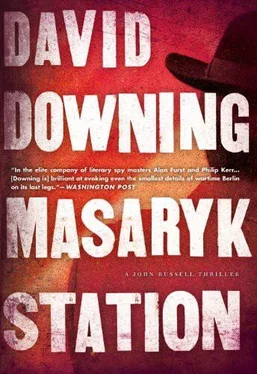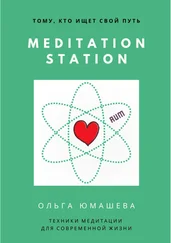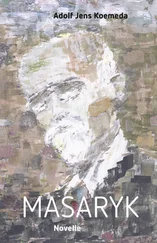David Downing - Masaryk Station
Здесь есть возможность читать онлайн «David Downing - Masaryk Station» весь текст электронной книги совершенно бесплатно (целиком полную версию без сокращений). В некоторых случаях можно слушать аудио, скачать через торрент в формате fb2 и присутствует краткое содержание. Год выпуска: 2013, ISBN: 2013, Издательство: Soho Press, Жанр: Шпионский детектив, на английском языке. Описание произведения, (предисловие) а так же отзывы посетителей доступны на портале библиотеки ЛибКат.
- Название:Masaryk Station
- Автор:
- Издательство:Soho Press
- Жанр:
- Год:2013
- ISBN:9781616952228
- Рейтинг книги:4 / 5. Голосов: 1
-
Избранное:Добавить в избранное
- Отзывы:
-
Ваша оценка:
- 80
- 1
- 2
- 3
- 4
- 5
Masaryk Station: краткое содержание, описание и аннотация
Предлагаем к чтению аннотацию, описание, краткое содержание или предисловие (зависит от того, что написал сам автор книги «Masaryk Station»). Если вы не нашли необходимую информацию о книге — напишите в комментариях, мы постараемся отыскать её.
Masaryk Station — читать онлайн бесплатно полную книгу (весь текст) целиком
Ниже представлен текст книги, разбитый по страницам. Система сохранения места последней прочитанной страницы, позволяет с удобством читать онлайн бесплатно книгу «Masaryk Station», без необходимости каждый раз заново искать на чём Вы остановились. Поставьте закладку, и сможете в любой момент перейти на страницу, на которой закончили чтение.
Интервал:
Закладка:
After taking possession of the reels in their brown paper parcel, Shchepkin seemed reluctant to leave.
‘So what’s the latest from Karlshorst?’ Russell asked.
‘You know about Sokolovsky’s letter.’
‘I think everyone in Berlin does.’
‘Well, today our man at the Control Council will be willing to discuss a compromise. And this afternoon, our man at the City Council will announce the introduction of a new Soviet currency for all of Berlin.’
‘Keep them guessing, eh?’
‘Something like that.’
‘It won’t work. The Allies will just extend their currency to Berlin.’
‘Probably. And then the shutters will fall.’
‘And after that?’
Shchepkin shrugged. ‘By then, you and I may be past caring.’ He got wearily to his feet. ‘I won’t reach Moscow before Friday, so you have a few more carefree days. After that, watch out.’
‘We will.’
‘Have you hidden yours away?’
‘Not yet.’
‘Do it, but not too deep. It won’t be there long.’
‘Why not?’
Shchepkin smiled. ‘I’ll tell you that when I get back. Early next week, I hope.’
‘Good luck.’
The Russian nodded, and strolled off towards the Brandenburg Gate, leaving Russell to walk back across the park. He hadn’t yet hidden their copy of the film because he couldn’t decide where to hide it. There was no place of concealment in their small flat which would escape a thorough search, and leaving it in a station left-luggage locker would simply transfer the problem. In the old days he would have sent the ticket to himself at a poste restante , but with Berlin’s immediate future so uncertain-and the Soviets already wreaking havoc with the postal services-that course also seemed much too risky.
Burial was the obvious alternative, but where could he bury the damn thing? There was only an overlooked courtyard at Carmer Strasse, and, as Russell had said to Effi the previous evening, he could hardly return to the scene of his earlier excavations in Thomas’s garden. Which only left the Grunewald. That evening, he thought. A long walk through the trees.
Carrying a spade was clearly not on, so he spent most of the afternoon trawling the local shops in vain for a digging implement he could carry under his jacket. In the end he settled for one of their serving spoons, on the dubious grounds that it was better than nothing.
After dinner with Effi and Rosa, he caught a 76 tram on Ku’damm, rode it to the end of the line, and then walked down Konigs Allee to the old Hundekehle restaurant, where he and Paul had often shared a Saturday ice cream. Beyond it, the forest stretched several miles to the west, and several more to the north and the south. A haystack for his needle.
There were an annoying number of people on the paths, out enjoying the evening sunshine. And as he discovered a few minutes later, there was a surprisingly large band of optimists casting their flies out into the Grunewald See. He turned off into the trees on his right, and soon found the clearing where they’d often picnicked more than ten years before. While the children had played their games, he, Ilsa, Thomas and Hanna had sat and drunk wine and ridiculed the Nazis. Who had had the last laugh? he wondered.
There was no one there now, only dappled grass and branches swaying in the breeze. Russell walked around the edge of the clearing, looking for a suitable place. It couldn’t be too obvious, but he had to be able to find it again.
One tree with spreading overground roots seemed to be a good bet, and for several minutes he sat with his back to the trunk, listening and watching for the sounds of humans nearby. On such a lovely summer evening it was hard to believe that the city beyond the forest was under virtual siege.
When he was certain as he could be that no loving couple was likely to rise out of the nearby long grass, he went to work with his spoon, carefully scooping the earth out from between two roots. The soil was looser than he expected, and it didn’t take him long to excavate a foot-deep well for the tin. After laying it flat on the bottom, he re-filled the hole, and did what he could to disguise the fact that one had been dug. The sun had sunk behind the trees, and it was hard to see his handiwork, but he was fairly confident that no one would find the tin by accident.
For all that, he felt reluctant to leave. He couldn’t shake the thought that he might have been watched, that someone had seen him bury something, and was only waiting out there in the dark for the chance to dig it up. He knew it was crazy, but there it was. And as he sat there, Russell remembered Mordechai Kohn, the death camp escapee he had interviewed a year or so after the war. Mordechai’s survival tip was to imagine how things might pan out, like a novelist unfolding a plot in his mind, and then take what steps seemed appropriate to help himself and hinder his enemy. ‘A simple example,’ he told Russell, ‘you imagine people coming to arrest you. What will you do when they knock on your door? Well, the first thing you do is head for a back window. And if it’s already open, that will save you precious seconds. So you go and open the window now, before they knock on your door.’
Sitting against the tree in the rapidly-darkening forest, Russell tried to follow the young Jew’s advice. He imagined what might happen, and what he could do about it. One thing came to mind.
It became apparent next morning that their days of waiting were also likely to decide the fate of the city. The morning papers bore out Shchepkin’s predictions of the previous day, and later that morning an RIAS news reporter announced that General Clay had rejected ‘in toto Soviet claims to the city of Berlin’. This was followed up midafternoon by the much-anticipated news that the Western currency reform would be extended to include Berlin. Details would be broadcast at eight that evening.
Like most of the city’s inhabitants, Russell, Effi, and Rosa tuned in to hear them. From midnight on Friday, the old Reichsmarks could be exchanged for new Deutschmarks, on a one-to-one basis for the first sixty, and at a rapidly declining rate thereafter.
‘The shops will be packed for the next two days,’ Effi said.
‘Those that are open.’
The three of them went down to Ku’damm to see what was happening, and found the pavements jammed with people trying to spend their Reichsmarks on goods or extravagant dining. But most of the shops had shut early, and several restaurants had already altered their menus, offering only food that would spoil, and hoarding the rest until the change had been made.
‘Have we got any bills to pay?’ Russell asked Effi on the way home. ‘Because now’s the time to pay them.’
Next morning they woke to a steady drizzle, and the news that the Soviets had closed the road and railways between the Western Zones and Berlin. Some people, though, were already fighting back. KPD demonstrators had been thwarted the previous evening when they’d to break up a City Assembly meeting, and the latter had then decided by a large majority to allow competition between the new Western currency and its Soviet counterpart.
Another hour, and RIAS was reporting sporadic power failures in all three Western sectors of the city. Asked to explain these interruptions in the electricity supply, a Soviet spokesmen claimed serious ‘technical difficulties’ were affecting one of the generating stations in their sector.
Soon after that, Thomas phoned. There was going to be a mass meeting at the Hertha stadium that afternoon-Russell was welcome to a lift if he wanted to come. He did. An hour or so later, when Thomas arrived at the door, the American garrison commander Frank Howley was spitting defiance on the wireless. After promising Berliners that the American people wouldn’t let them starve, he warned the Soviets not to trespass in his sector. ‘We are ready for you-and if the day comes, believe me, many a comrade will go across the golden Volga.’
Читать дальшеИнтервал:
Закладка:
Похожие книги на «Masaryk Station»
Представляем Вашему вниманию похожие книги на «Masaryk Station» списком для выбора. Мы отобрали схожую по названию и смыслу литературу в надежде предоставить читателям больше вариантов отыскать новые, интересные, ещё непрочитанные произведения.
Обсуждение, отзывы о книге «Masaryk Station» и просто собственные мнения читателей. Оставьте ваши комментарии, напишите, что Вы думаете о произведении, его смысле или главных героях. Укажите что конкретно понравилось, а что нет, и почему Вы так считаете.












